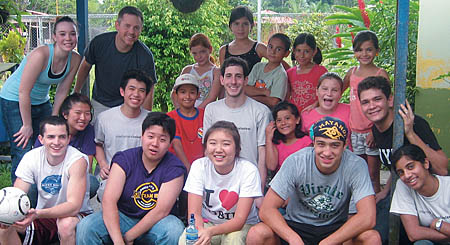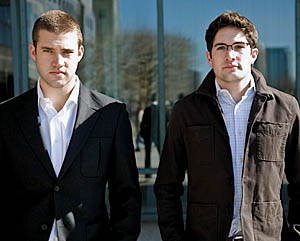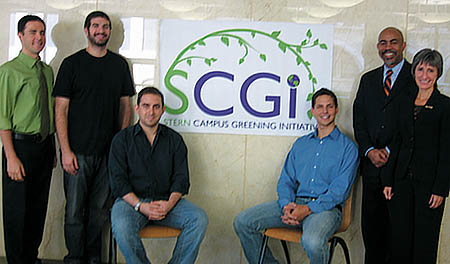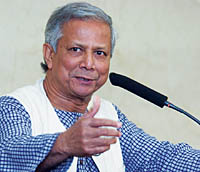contents
A Letter from the Dean
Public Offerings
NYU Stern, The Economist, and CFR.org talk global issues in the ’08 campaign; scholars and industry chiefs take the pulse of the credit crunch; how managers of hedge funds and quant funds find value; After Market Hours speakers reflect two sides of the entertainment industry; Marc Rotenberg sounds off on privacy in the Google era; and former UN Special Envoy Stephen Lewis rails at poverty and disease in Africa
Stern in the City
Developer Joe Sitt’s bold vision for Coney Island, By Jenny Owen
Ros Stephenson leads at Lehman Brothers Corporate Finance, By Rika Nazem
Going Short and Winning Big
8 questions for John Paulson
Cover Story – The Values Proposition
NYU Stern prizes a well-rounded education that teaches about business and its role in society, not just how to maximize shareholder value, By Thomas F. Cooley and Doug Guthrie
Special Feature – Building Connections
A dramatic facilities renovation brings the campus up to par with its growing reputation, By Marilyn Harris
Leading Indicators
Stern’s CEO Series: Doug Conant of Campbell Soup talks about reviving the iconic consumer food giant, and John Mack of Morgan Stanley reports on global trends in the finance industry
Prospectus
New faculty appointments, noteworthy papers, awards, and honors
Office Hours –
Faculty
Research
The Subprime Mortgage Crisis
Early signs of a credit crunch were hidden, but discoverable,
By Yuliya Demyanyk and Otto Van Hemert
Does Chatter Matter?
Record industry marketers may want to tune in to the Web to spark album sales, By Vasant Dhar and Elaine Chang
Paying a Premium
The faulty assumptions consumers make that lead them to overspend on insurance, By Zur Shapira and Itzhak Venezia
|
PEER TO PEER
Student Life in Washington Square and Beyond:
Doing good in Costa Rica, creating an interactive résumé, going green in Washington Square, and lending “social dollars”
Alumni Affairs
Alumni News and Events: Community-building initiatives, professional resources for alumni, the first Alumni Business Conference, and alumni in Los Angeles
Class Notes
Past Performance
Charles Waldo Haskins, accounting evangelist and Stern founder, By Marilyn Harris |
|


Misha Esipov (front row, second from right) and his fellow classmates worked with elementary school students in Costa Rica to improve the appearance of their school. |
Community Building on a Global Scale
In January, Stern sophomore Misha Esipov and nine of his fellow undergraduate students arrived in San Jose, Costa Rica, one of the most popular vacation destinations among 20-somethings today. But there was no surfing or sun-bathing for Esipov and his classmates; rather they headed to an inland town two hours north of San José called Ciudad Quesada (better known by the locals as San Carlos) where they didn't see another tourist for a week.
Esipov and his team were there as part of the newly launched program, Stern International Volunteers, which was established to complement the School's four-course sequence in social impact and to provide a small group of students with first-hand exposure to communities in developing economies through service work. The inaugural year was made possible through the generosity of Stern alumnus Fred Poses (BS '65) and a partnership with New York non-profit Cross-Cultural Solutions.
The students spent the next week scrubbing, scraping, and painting the Escuela República de Italia, a local elementary school. The school, which was built in 1938, is extremely overcrowded, forcing its 300-plus young students to attend in half-day shifts.
“The experience was really eye-opening. On our first day at the school, we were given the most basic tools to work with and the job, in some ways, seemed unattainable. But, the spirit of the community and our team was really inspiring,” Esipov explained. “For instance, we learned that the families in the community had contributed the money to buy the paint – something the school couldn't afford on its own.”
The week proved a true partnership between the community and the Stern team. “It was particularly rewarding to meet the kids who attended the school. Many of them worked hand-in-hand with us as we painted,” said Esipov. “And, on our last day, a few dozen of the students put on an extravagant dance performance. It felt great to see that we made an impact on their lives, even though they really made more of an impact on ours.”
The end result of the week's work was a two-toned, vibrantly pink school, a clean and reorganized school library, and a newly painted computer room. “And our final touch was to mark one of the freshly painted cinderblocks with the NYU torch, the Stern name, and each of our signatures,” described Esipov. “It was wonderful to leave a piece of NYU Stern and ourselves behind.” |
Stern Senior Branches Out With Online Résumé Venture

Business partners and fellow NYU students Andrés Sette Arruza (left) and Randall Green created BayanLink to provide job-seekers an online platform to network and promote themselves. |
“A résumé can only tell you so much about a person,” observed Stern senior Andrés Sette Arruza (BS '08). Arruza, along with NYU alumnus Randall Green (Gallatin '07), conceived BanyanLink in 2006 as a way to do better. BanyanLink is an innovative professional networking website that provides students and post-college job-seekers with a platform to promote themselves while connecting with peers, mentors, and potential employers. The site enables its users to create an interactive résumé by integrating social networking tools with a professional approach.
The venture grew out of the pair's dissatisfaction with the lack of resources available to help young people develop their passions early in life. “We thought it would be useful if there was an outlet for students to cultivate their aspirations and communicate with like-minded individuals,” Arruza explained. Facilitated by a board of advisors comprising Stern faculty, university administrators, and industry experts, Arruza and Green evolved their concept into an online network where users can present themselves as marketable professionals while also displaying their unique personalities.
“We see BanyanLink as the professional complement to social networking sites like Facebook,” Arruza said. “A BanyanLink profile is essentially a personal brochure. You can display the typical qualifications found on a résumé, but you can also include distinctive details such as what languages you speak, photos of your travels, and authors who inspire you. The goal is to encapsulate each person as a well-rounded individual.”
The recently launched BanyanLink is not only a boon for job-seekers, but for employers as well. “Instead of having to wade through identical-looking résumés, recruiters can search profiles of qualified candidates and obtain a sense of whether someone is a good fit for a position,” explained Arruza. He also stressed that networking on the site is not restricted to employer-student communications. BanyanLink's uniqueness stems from the fact that it works in conjunction with university career centers to facilitate communication between colleges, students, and employers: “BanyanLink isn't necessarily all about finding a job. Our goal is to integrate students, alumni, recruiters, and universities in a collaborative network to mentor each other, nurture passions and goals, and help promote personal growth overall.”
Arruza had originally planned a career in the music business. He credits his Stern education with giving him the skills and confidence to launch his own venture. “I came to Stern with very little business knowledge, and I learned so much that directly applies to what I'm doing today,” he said. For example, learning to develop a comprehensive business plan and understanding the legal aspects of starting a business have helped the two students secure financing for their endeavor. “My Stern education has been instrumental in BanyanLink's implementation,” Arruza remarked.
Upon graduation, Arruza and Green will dedicate themselves full-time to BanyanLink, which takes its name from the banyan tree whose branches generate new limbs that then dig into the ground and become roots of additional, conjoined trees. “The banyan tree literally networks with itself,” Arruza explained, “which inspired our vision for the website. We envision a worldwide collaborative professional community that encompasses various industries, colleges, and alumni networks and provides a forum for young professionals to network, nurture others, and grow.”
NYU Stern “Goes Green” with Campus
Greening Initiative

Students and administrators team up to "green" Stern (from left to right): Associate Director of Student Activities Jeremy Carrine (Steinhardt '06), Jake Berlin, Robb Henzi (MBA '08), R. J. Panda, Dean of Students Gary Fraser (MBA '92), and Kim Corfman. |
R. J. Panda (MBA '08) has a passion for environmental issues. He studied environmental health engineering at the University of Connecticut, and when he arrived at Stern, he joined the Social Enterprise Association (SEA) – an MBA student club focusing on corporate social responsibility, social enterprise, and non-profit management – with the aim of bringing an environmental mindset to the School. The result: the Stern Campus Greening Initiative (SCGI), which Panda started with the support of SEA and Stern leadership. “Through the SCGI, we want to encourage the Stern community to think about its impact on the environment and, eventually, effect a long-term change in behavior and mindset,” explained Panda. “And with these issues becoming fundamental components of business strategy in the companies we will be working for when we graduate, the Initiative is also providing valuable professional experience for us students.” Helping Panda to green Stern are student Jake Berlin (MBA '09) and the SEA Greening Committee.
First-year MBA students were exposed to Stern's greening efforts on day one at pre-term orientation. Brochures had been printed on recycled paper, students were given computer “flash” drives loaded with digital information instead of handouts, and sustainable materials were used in all catering paper products. Other projects include the launch of the SCGI website (www.stern.nyu.edu/green), the inclusion of a “Green Tip of the Week” on student and administrator intranets, a student printing quota, motion sensor lighting in study rooms, and a more aggressive recycling program, all branded with the initiative's “identity” to raise awareness on campus. To support the curricular program in social enterprise, social entrepreneurship, and corporate social responsibility, a new course was taught this spring by Frances Milliken, professor of management and organizations, and Mark Tercek, adjunct professor and director of Goldman Sachs's Environmental Markets Initiative. The course, “Leading Sustainable Enterprises,” focuses on creating, leading, and managing business enterprises that seek to facilitate sustainable development.
Vice Dean for MBA Programs and Professor of Marketing Kim Corfman is a member of the SCGI, as well as a strong supporter. “More than 35 years ago, NYU Stern introduced a required 'professional responsibility' core course into the curriculum, and today, 60 percent of our MBA courses integrate content related to social and environmental impact and stewardship,” she said. “Our school-wide sustainability efforts complement all that we are doing in the classroom to promote a socially responsible mindset in our students.”
Panda's vision has become a force on campus. “As the only school-led environmental initiative, the SCGI, along with the support of administrators, faculty, and students, is leading the University in this area, and is showing other departments the positive effect they can have on their surroundings,” he said. Berlin, who will lead the SCGI next year, agrees. “The momentum we've created will continue. These efforts are now a part of the fabric of the School.” While NYU's school color may be purple, Stern is adding a 'green' hue. |
Executive MBA Students Learn About Micro-Lending from its Founder, Nobel Laureate Muhammad Yunus

Dr. Muhammad Yunus spoke to students last fall about micro-credit, the revolutionary idea that won him the Nobel Peace Prize. |
More than 150 MBA and Executive MBA students at NYU Stern in September had the rare opportunity to hear Dr. Muhammad Yunus, the 2006 Nobel Peace Prize winner recognized for his social and economic leadership in revolutionary programs that benefit the rural poor. Yunus spoke about microfinance – the system he created – and the role of women in developing a strong family structure through entrepreneurial activities.
Yunus, founder of the Grameen Movement to promote awareness and action for the elimination of poverty and hunger, discussed the birth of micro-credit more than 25 years ago. He explained how he was “pushed by the circumstances” to create what has become a true phenomenon. In 1971, he was teaching economics at Chittagong University in Bangladesh, when, “after much bloodshed,” the country won its independence from Pakistan. Just three years following the war, famine struck and hundreds of thousands of people died.
Surrounded by the crushing poverty that remained (Bangladesh lacked a welfare system), Yunus traveled around the villages offering help. He began tracking the number of people who had borrowed money from banks. His list totaled merely 42 borrowers with a combined total of $27 borrowed. Ultimately, Yunus said, he discovered the hard truth that banks would not loan money to the poor. As a result, he began taking out loans in his name for others. Eventually, he opened Grameen Bank, which now operates 1,092 branches in 36,000 rural Bangladesh villages, providing unsecured credit to more than two million of the country's poorest people, and micro-credit – or, as he prefers to call it, micro-capitalism, “because it reflects more clearly what we do” – was born.
Today, almost every country, including the US, has a micro-finance program modeled after and/or supported by the Grameen Bank Replication Program. The programs operate on principles opposite those of traditional banks. “We learned how traditional banks work, and then we set up our institutions to do the reverse,” Yunus explained. “The less you have, the bigger the loan. There is no collateral, no guarantee, no legal contract. Loans are built on trust, because these are hard-working people.”
Ninety-four percent of Grameen Bank's borrowers are women, who, in turn, have an unparalleled repayment rate of 98 percent. Women use the loans to buy assets for their micro-businesses that can immediately start paying income – such as cotton to weave, or raw materials for bangles, or cows to milk. They repay their loans in tiny weekly installments, at which point they can take out progressively bigger loans, ultimately becoming self-sufficient.
Yunus argued that poverty is created by the systems and institutions that society creates, specifically financial institutions, which “require you to have money to make money.” He said that business, in its simplest form, is the maximization of profit. But he declared that there should be a second type of business, one to “do good for the people.” He explained, “The social dollar is very powerful because it comes back to you and continues to be used over and over again for social good.”
Yunus closed his talk with a powerful message: “We can put an end to poverty on this earth. It can exist only in museums. All we need is a bold decision that it can be done.”
|
|


![]()